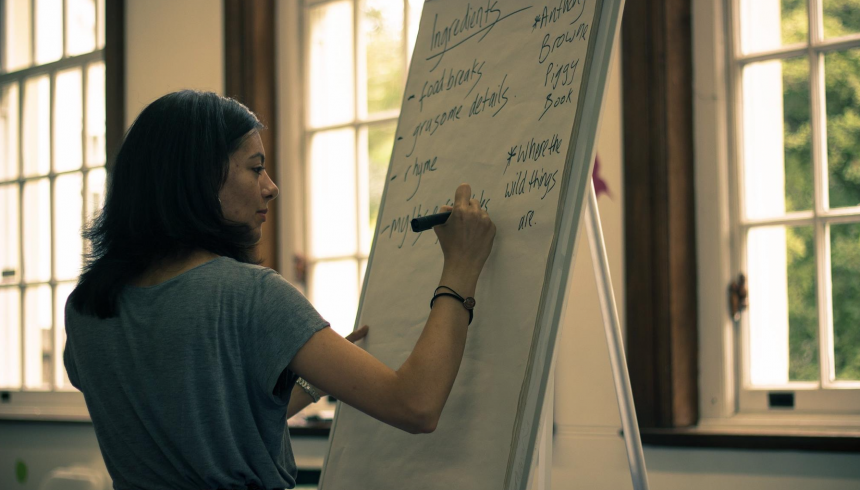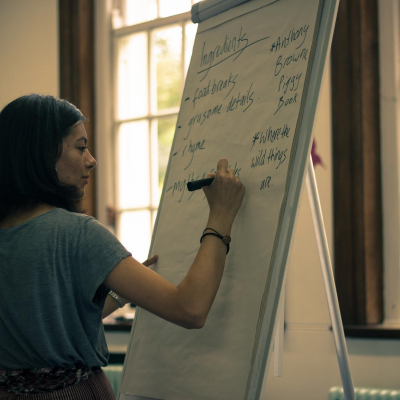It’s been an exciting week at JRS as we launched a new activity workshop for our refugee friends, to complement the services we would usually provide at our drop-in Day Centre. Little did we think that this challenging time of lockdown would provide such exciting opportunities to grow our refugee activities!
The new ‘Open Writing Space’ adds to our busy weekly activities schedule, which currently takes place exclusively over Zoom and Whatsapp, and is facilitated by Laila Sumpton. Laila is a half Indian half British poet who has been working with learners of all ages for ten years. She is passionate about writing about our identities and histories and helping learners share their stories. She has worked with numerous refugee and migrant learners and themes over the years developing resources and delivering workshops for the British Library, the National Literacy Trust, and women’s refugee charity Routes, among many others. Recently, she developed a poetry resource and workshop series for young people called ‘Migration Tales’ in collaboration with Counterpoints Arts and The Ministry of Stories. She performs her work regularly and has a forthcoming collection.
Despite her busy schedule, Laila very kindly agreed to speak with us and tell us a little more about the new JRS Open Writing Space, her own creative work, and the power of poetry.
Hi Laila. can you tell us more about the new JRS open writing space?
The Open Writing Space will explore many different kinds of writing- short story, articles, scripts, poetry and letters. Some of the writers are preparing for English language exams, others are looking for creative outlet and many have written poems or stories previously. We are excited to gather and explore themes such as lockdown, nature, rights and spiritualism and look forward to sharing work both printed and maybe even performed. The writers bring together many stories and languages and together we will support each other’s writing journeys and encourage each others creativity. We are lucky to work with three mentors and activity coordinator Dallya- whose positivity inspires the group.
You can help us continue our schedule of vibrant and creative activities that empower refugees, by donating to our Refugee Friends’ Hardship Fund today
How and when did you get started as a poet?
I was always writing poetry and stories as a child, I wrote a poetry collection about the contents of my pencil case when I was eight! I loved creating worlds and as a dyslexic learner I somehow found poetry easier than prose, and enjoyed both the freedom and structure it gave my ideas. I studied literature and human rights and wanted to bring the two together in my work; using poetry to investigate rights and help tell unheard stories. I needed to make poetry my full time work somehow and luckily I was invited to join the Keats House Poets, a group of emerging writers supported by Keats House Museum. That was in 2010 and I have been performing my work and running poetry projects with a wide range of learners and venues ever since.
Where do you find inspiration to write poetry?
I think poetry can be a wonderful way to unravel your thoughts and sometimes I use my own life and memories as the starting point for my poems. Some of these stay private, some make it out onto pages or stages. You can also vividly capture and condense memories or histories through poetry, and I have been writing about the stories from both my Yorkshire and Indian families. I enjoy encouraging learners to use a range of different prompts for their writing – art, photography, music, articles, non-fiction, objects, food – anything!
What is it that draws you to working with asylum seekers and refugees?
I am always interested in different understandings of language, and if English is your second or even third language then there will be some really original ways of phrasing your thoughts inspired by the other languages you live in. I have worked on poetry projects and performances with numerous refugee and migrant writers, it is so important that we make space for the sometimes hidden experiences, and we all have so much to learn from people who have lived between different cultures.
If you could give one piece of advice to our refugee friends who might like to try creative writing for the first time what would you say?
Everything has a story- a cloud, a teapot, your neighbour who you barely see, a crow, your shoes, your grandma, a town, a pineapple – ask something or someone what their story is and write what you hear. A good writer asks lots of questions, if you can ask these then imagine up the answers!
Find out more about Laila’s work and watch her recite her poetry https://rightsblog.net/2020/06/11/q-a-with-laila-sumpton/
Help us continue creative work to empower refugees, by donating to our Refugee Friends’ Hardship Fund today



